"There's always more demand for organic cucumbers than we can supply," organic grower Koen van Hauteghem of Vitaetom stated last fall. During a visit - at the invitation of VLAM, Flanders' Agricultural and FIsheries Marketing Board - to his family farm in Belgium last Friday morning, he referred back to that statement with an ironic smile. Those cucumbers are not doing so well this year.
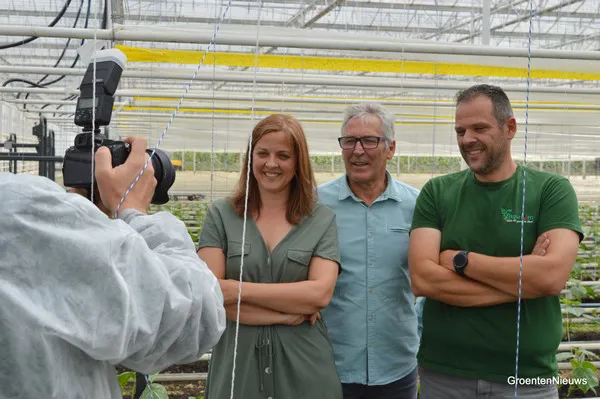
The Van Hauteghems posing for an 'official' photo, with mother looking on. F.l.t.r. Annelies, Walter en Koen.
Koen discussed organic farming's challenges and developments in his company. He did so during a tour, which his parents and sister joined, of the company's greenhouses. His father, Walter, is officially retired but still enjoys helping out, though Koen has taken over overall management.
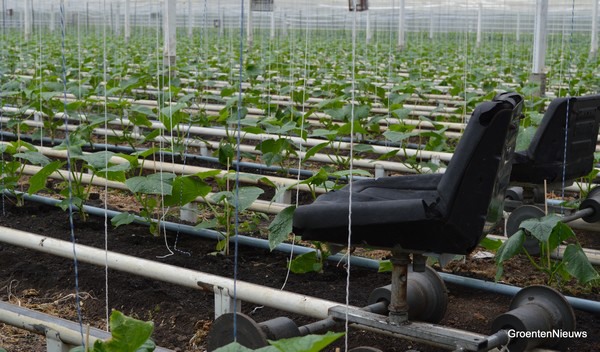 The new round of cucumber plants in progress.
The new round of cucumber plants in progress.
PFAS issues
The family runs the business, which consists of two hectares of greenhouses and 6.000m2 of open-field zucchini cultivation. Plans to add another 1.7 hectares of greenhouse at a location nearby are on hold. PFAS issues make growers afraid to plunge into small fruit farming. No one is making bokashi from the ryegrass, which grows on company premises, either. The growers are concerned about the area's negative image. Fortunately, extensive tests prove there is nothing wrong with the greenhouse's vegetables.
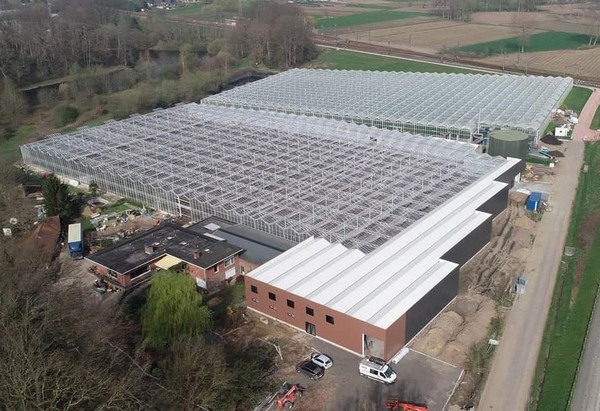
In the foreground, the new greenhouse and warehouse.
There is little room for growth at the farm. They could build another greenhouse where zucchini now grows. Koen knows greenhouse builders would welcome that. They have the space, but Koen is in no hurry. Construction must start by September 2025 at the latest if he still wants to use his 2020 permit.
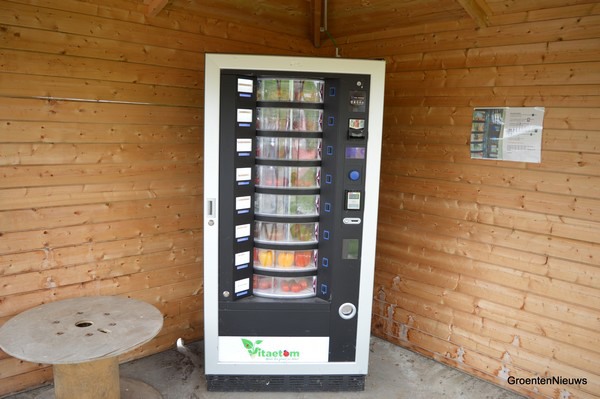
In early June, the new vegetable vending machine was fully stocked.
Vegetable vending machine
In 2021, Vitaetom did have another greenhouse, and a much bigger processing hall, built. "We no longer have to load outside in all kinds of weather or at two places," says Koen. The greenhouse replaced a 40+-year-old greenhouse that once housed strawberries. These days, they grow zucchini, cucumbers, bell peppers, and tomatoes. And two years ago, they added sweet pointed peppers to the assortment.
Vitaetom does its own packaging, and on Friday morning, Andy, pictured below, was at work in the packaging warehouse packing tomatoes. He has a job at Vitaetom because the company also serves as a care farm - where people that need aid or guidance can work - well before switching to organic in 2016.

There is still much hands-on work involved in filling small packaging with vegetables.
A board with clear explanations and pictures helps the people in the hall pack and prepare all kinds of vegetables for transport. This year, the farm, at the town council's encouragement, began selling these vegetables itself, too. A vegetable vending machine - the growers strategically placed it along the bike path - thus, now stands next to the greenhouses.
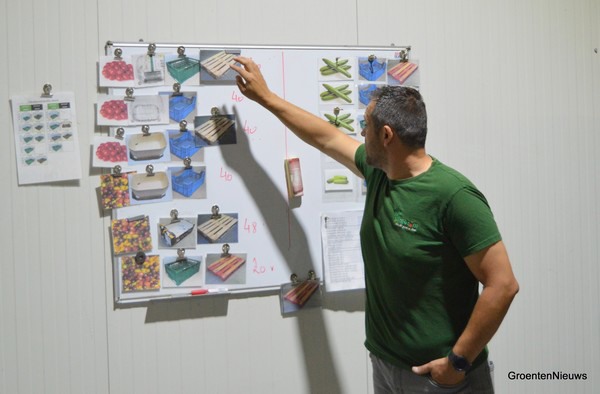
Koen explains all the different packaging options, including, since this year, shakers filled with tomatoes for Colruyt supermarkets.
Mini cucumbers
Like sweet pointed peppers and the vegetable vending machine, mini cucumbers are also new to Vitaetom. It is the second year they are growing these. Organically cultivated mini cucumbers are quite unique. Only a few growers have them, Koen points out. Vitaetom is growing them to 500m2 this year.
Koen decided to add 200m2 to the second crop round last year already - a decision he now regrets. "We coordinate what we grow with the BelOrta cooperative. They do our sales, 80% of which are on a contract basis. We decided, independently, to expand the mini-cucumbers halfway through last season. And, though it was only slightly more, we had a hard time selling them."
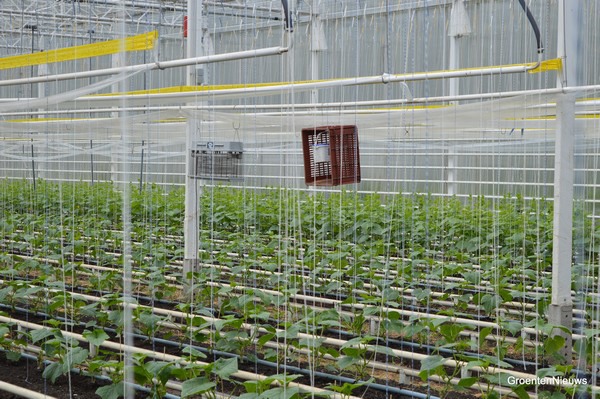
The red box holds organic pesticides, with a few rows of mini cucumbers behind that.
Mild spring
It is going better this year. Koen suspects clients need to get to know the product first. He had the same experience when introducing cherry tomatoes a few years ago. These, too, sold with difficulty the first year but are now best-sellers.
There is nothing to say about this year's standard, long cucumbers. Koen reports that a mild spring caused a 15% deficit. Despite that more limited supply across the board - all growers struggle with the same problem - prices keep lagging.
"Conventional cucumbers are having a hard time, too, with truly dismal prices. I think the price difference with organic is getting too big. And that resulted in us having to sell our cucumbers as conventional for the first time. We just couldn't get them sold," Koen explains.
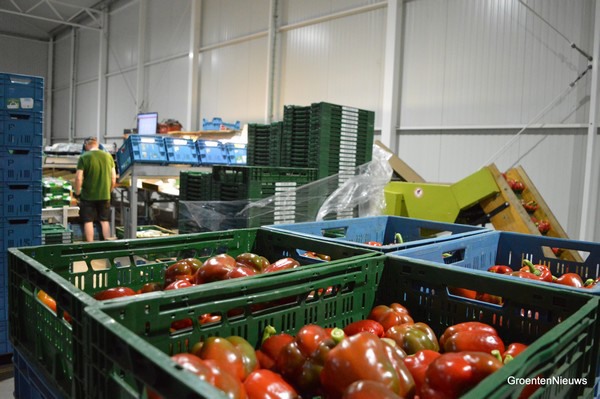
Inflation
From the processing hall, we moved to the greenhouse. VLAM's invitation to visit was aimed at reviving 'bio week.' This week died a quiet death in Flanders a few years ago. It is still held in Wallonia; this year, from June 3 to 11. With a seminar on June 1 and this company visit, the Flemish Agro and Fisheries Marketing Center want to prepare the market for a full-fledged organic week edition in Flanders in 2024.
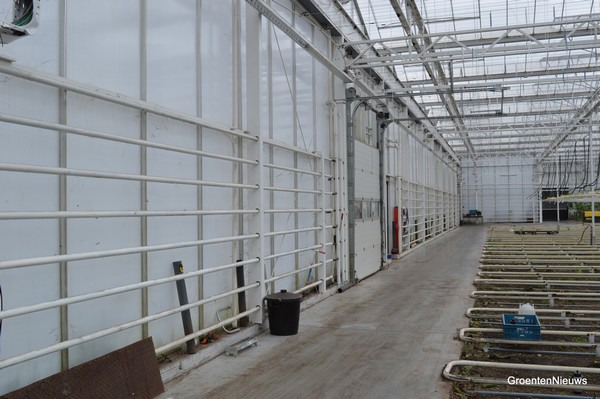
This polycarbonate wall is white, which reflects incoming light more. Koen reckons that adds light to this dark corner of the building in winter. Also, polycarbonate, transparent along the other facades, insulates better than glass.
The organic products market situation was discussed at that seminar. What is striking is that people in Wallonia buy almost twice as much organic as the Flemish. The gap is narrowing, though. Inflation worries people, but the 2022 figures show that it did not affect organic product purchases in Flanders. On the contrary, in Flanders, five percent more fresh organic goods were bought in 2022.
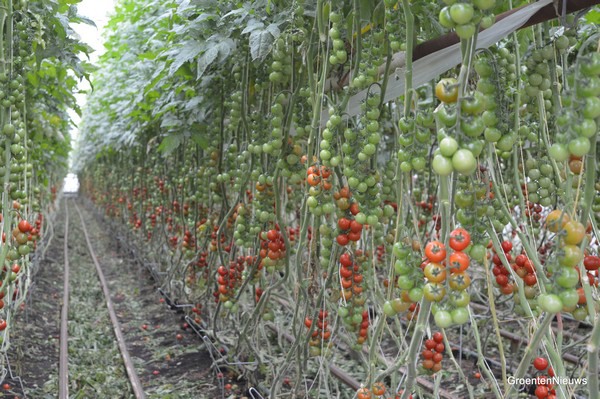
Organic tomato variety choices are limited, so they grow conventional varieties with exemption. These must fit into the Flandria segmentation.
Price increases
Koen, who is aware of those statistics, is not complaining about sales, which this year are better across the board, price-wise than last year. He was surprised that the retail sector proved willing to raise prices by 10 to 15%. That was also sorely needed to cover the sharply increased costs.
Yet, not all those costs are covered. Koen sees no point in passing on his increased energy costs to consumers. Even with a favorable energy contract until 2025 and CHPs, his costs have risen, and passing on even those costs would make the organic products too expensive.
Koen knows that the market situation, as a whole, has affected BelOrta's organic fruit and vegetable supplies. He speaks of a seven percent drop in supply, whereas in recent years, that always increased slightly.
The first round of cucumbers is almost done in the newest greenhouse. In early June, the quails the company relies on for weed control are quietly going about their business in a fairly empty greenhouse. Further back, however, things are turning green again: the mini and standard cucumbers have been planted.

We spotted a quail.
Large bell peppers
They have been planted in the soil the growers had a job getting back into shape. The construction activity hardened it and eventually, they loosened the earth with a rotavator. Worms, fungi, bacteria, biostimulants, and compost did the rest. A little too much compost, perhaps, it seems. The pH level has risen considerably, so the growers will use white peat to try to decrease the pH level a bit.
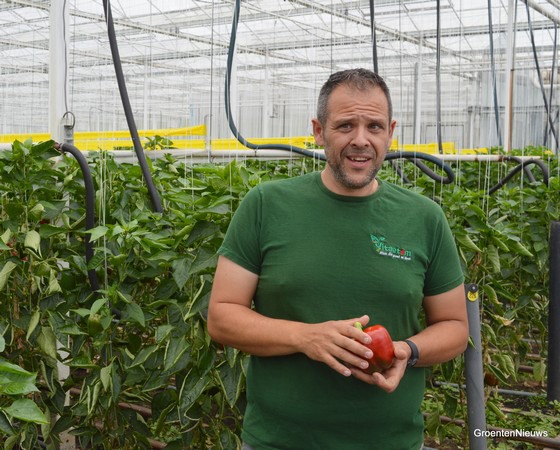
The bell pepper crop is producing large fruit, much to Koen's delight.
In the other greenhouse, bell peppers are doing very well this year. "We've never had such large peppers before," Koen observes with satisfaction. And he does not know exactly why. He gladly compliments his sister Annelies, who has biological pest control well in hand. Chemical control is out of the question in organic farming. That means organic growers must cope with things going wrong sometimes.
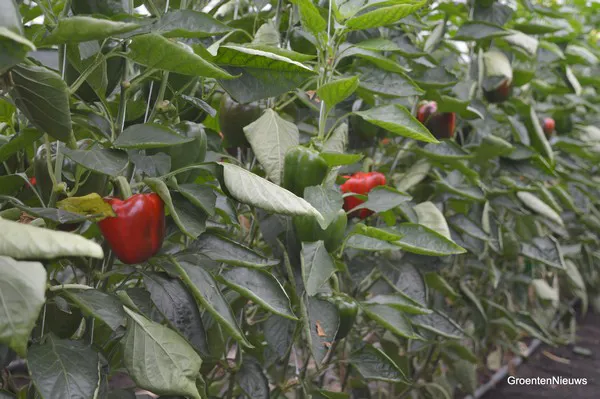
Biology
That is something Koen had to do last year with one of their three bell pepper crops. He ended up harvesting 14 kg/m2, ten kilograms less than normal. That was because of a severe aphid infestation. Annelies and Koen suspect an aphid infestation from outside killed the plants last summer, wiping out the strong plants within a week. Afterward, Annelies discovered that a predatory fly had affected the aphids' natural enemies, thus giving them free rein.
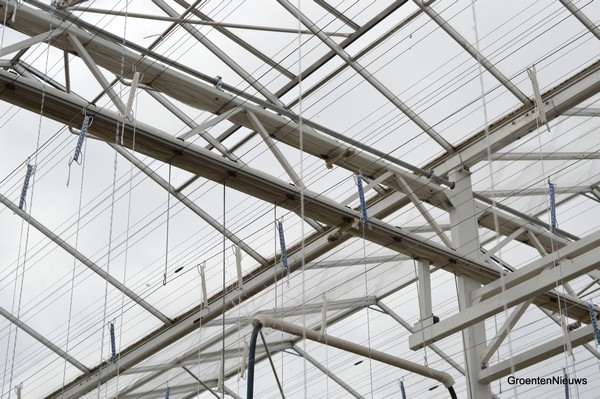 The new greenhouse has double screens.
The new greenhouse has double screens.
They, and supplier Biobest, are doing lots of biological testing, including in the tomatoes growing nearby. Because of virus pressure, growers want to keep the dreaded Tomato brown rugose fruit virus out, so we kept our distance. The predatory mite Pronematus ubiquitus controls the tomato gall mite.
Trials have been running for three years. It was thought that predatory mites could also control mildew. That, however, did not quite succeed this year. Koen believes they kept too many leaves, allowing too much mildew to remain for the mites to eat. A fully comprehensive solution is still being sought.
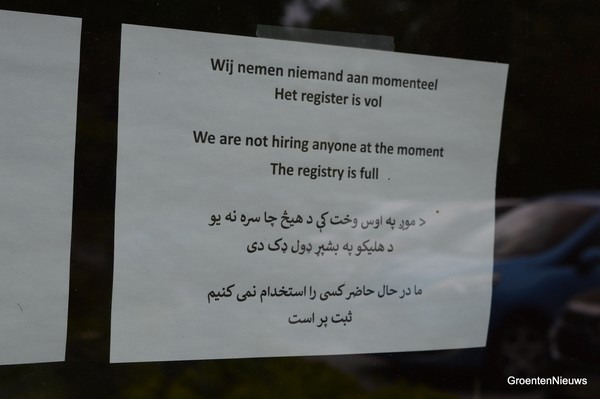
No staff shortage here: from a nearby asylum seekers' center, many Afghans offer their services, too many for Vitaetom to employ.
During the tour, Walter, standing beside a compost heap, reiterated that organic farmers must deal with things sometimes going awry. The product prices thus include a small risk premium, adds Koen, who, with his family, led us on Friday morning's comprehensive tour of their company. If it is up to VLAM, several of his fellow growers will do the same in next year's bio week. In these times of inflation, this extra promotion for organic products is certainly most welcome.
For more information:
Vitaetom
Facebook page
